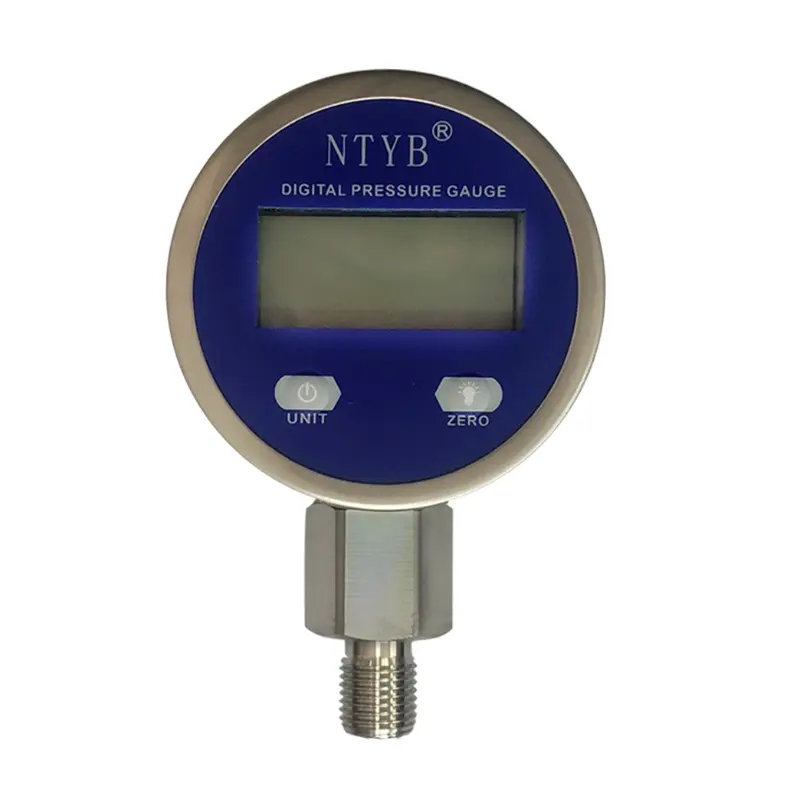Corrosion resistance of stainless steel pressure gauge: Application in the chemical industry
Release time: 2025-01-14
In the chemical industry, accurate pressure monitoring is a key link to ensure the safety of the production process and product quality. Since chemical production involves a large number of corrosive chemicals, the corrosion resistance of the pressure gauge has become an important consideration when selecting pressure measurement equipment. Therefore, stainless steel pressure gauges have been widely used in the chemical industry due to their excellent corrosion resistance.
Corrosion resistance of stainless steel pressure gauge
Stainless steel materials have natural oxidation resistance and corrosion resistance, which makes them perform well in harsh chemical environments. Common stainless steel materials such as 304 and 316 stainless steel have become the first choice in many industries due to their excellent corrosion resistance. Although 304 stainless steel is suitable for conventional chemical environments, 316 stainless steel has more outstanding advantages for highly corrosive chemicals such as chlorides. 316 stainless steel has added molybdenum elements, which makes it more resistant to chlorides, seawater, acidic solutions, etc. Therefore, 316 stainless steel pressure gauges are particularly suitable for use in the chemical industry.
Many chemical reactions in the chemical industry release highly corrosive gases or liquids, which often corrode equipment, especially in high-temperature and high-pressure working environments. If you choose a pressure gauge that does not have corrosion resistance, it is easy to cause equipment damage and even affect the stability of the entire production process.
Application of stainless steel pressure gauges in the chemical industry
Reactors and reactors
Chemical reactors and reactors usually carry out high-temperature and high-pressure chemical reactions, and the reactants and products are often highly corrosive. The use of stainless steel pressure gauges can effectively avoid inaccurate pressure measurement and equipment damage caused by corrosion, ensuring the safety and efficiency of the reaction process.
Pipelines for corrosive liquids
In chemical production, corrosive liquids are often transported through pipelines, and pressure monitoring in pipelines is crucial. Stainless steel pressure gauges can maintain long-term stable operation in the environment of corrosive liquids, provide accurate pressure data, and ensure the normal operation of the production system.
Storage tanks and tanks
In the chemical industry, the storage of chemicals often involves high pressure and corrosive chemicals. The use of stainless steel pressure gauges can monitor the pressure changes of storage tanks in real time, detect potential leaks or pressure abnormalities in time, and prevent accidents.
Fertilizer and petrochemical industries
In the fertilizer, petrochemical and other industries, a large number of corrosive chemicals are involved in the production process. Whether it is gas, liquid, or high-pressure environment, stainless steel pressure gauges can provide accurate pressure readings, and have good corrosion resistance and can adapt to harsh chemical media.
Design and protection measures for stainless steel pressure gauges
In order to further improve the corrosion resistance of stainless steel pressure gauges, the design needs to take into account the unique working environment of the chemical industry. The housing, sensor, and connection parts of the pressure gauge should be made of corrosion-resistant materials to ensure its stability in long-term exposure to corrosive chemicals. In addition, the sealing structure of the pressure gauge is also crucial. The use of chemically resistant sealing materials (such as fluororubber, polytetrafluoroethylene, etc.) can prevent the leakage of chemical media, thereby enhancing the safety of the equipment.
For some special chemical environments, the surface treatment process of the pressure gauge is also crucial. For example, nitriding or coating protection can further improve the corrosion resistance of the pressure gauge and extend its service life. These design measures can effectively resist the invasion of strong acids, strong alkalis and other corrosive chemicals on the pressure gauge.
Stainless steel pressure gauges play an important role in the chemical industry due to their excellent corrosion resistance. Its stable performance can ensure accurate pressure data in highly corrosive chemical environments and ensure the smooth progress of the production process.
As the chemical industry’s requirements for equipment performance and safety are increasing, Ntpressuregauge provides customers with corrosion resistant stainless steel pressure gauges, selects high-quality materials and designs, and performs regular maintenance and inspections to deal with possible corrosion, wear and other problems.


